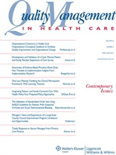
Quality Management in Health Care
Scope & Guideline
Exploring best practices for superior patient care.
Introduction
Aims and Scopes
- Patient Experience and Engagement:
Research aimed at understanding and improving patient experiences, engagement, and satisfaction within healthcare systems. - Quality Improvement Methodologies:
Studies exploring various quality improvement methodologies, including Lean management, Six Sigma, and other structured approaches to enhance healthcare services. - Health Care Policy and Management:
Investigations into the policies affecting healthcare quality, including hospital accreditation, regulatory frameworks, and organizational behavior impacting quality management. - Clinical Outcomes and Patient Safety:
Research focusing on the outcomes of clinical practices and interventions aimed at enhancing patient safety and reducing medical errors. - Interprofessional Collaboration:
Analysis of teamwork and collaboration among healthcare professionals to improve service delivery and patient care.
Trending and Emerging
- Digital Health and Telemedicine:
Growing emphasis on the role of digital health solutions and telemedicine in enhancing patient care and managing healthcare delivery, especially in the context of the COVID-19 pandemic. - Patient-Centered Care Models:
An increasing focus on patient-centered approaches that prioritize the preferences and needs of patients in designing healthcare services and interventions. - Data Analytics and Quality Improvement:
The use of advanced data analytics to inform quality improvement initiatives is trending, as healthcare systems seek to leverage data for better decision-making and outcomes. - Integration of Social Determinants of Health:
Research is emerging that integrates social determinants of health into quality management frameworks, recognizing the broader factors affecting patient care and health outcomes. - Collaborative Care Models:
A trend towards exploring collaborative care models that involve multiple disciplines and stakeholders to improve patient outcomes and streamline care processes.
Declining or Waning
- Traditional Quality Assurance Models:
Conventional quality assurance models that rely heavily on rigid protocols and less on adaptive strategies are being overshadowed by more dynamic, integrative approaches. - Generalized Health Care Studies:
Research that lacks a specific focus on quality management principles or methodologies is becoming less prevalent as the journal emphasizes targeted studies with clear implications for quality improvement. - Cost-Reduction Focus Without Quality Consideration:
Studies that prioritize cost reduction without adequately addressing the implications for quality and patient outcomes are appearing less frequently, reflecting a shift towards a balanced approach.
Similar Journals
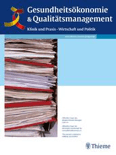
Gesundheitsoekonomie und Qualitaetsmanagement
Transforming Healthcare through Economic Understanding and Quality FocusGesundheitsoekonomie und Qualitaetsmanagement, published by THIEME MEDICAL PUBL INC, serves as a vital resource in the field of health policy, particularly within the context of Germany. Since its inception in 1999, this journal has been committed to advancing the discourse on health economics and quality management, making significant contributions to understanding the complexities of healthcare systems. With an impact factor that reflects its ongoing importance, the journal is categorized in the Q4 quartile for Health Policy as of 2023, indicating its role in serving a niche yet crucial space in medical literature. Although currently not an open access journal, it remains accessible through various academic platforms, making its content available to a diverse audience of researchers, healthcare professionals, and students eager to engage with contemporary issues in health economics. With its publication continuing through 2024, Gesundheitsoekonomie und Qualitaetsmanagement is essential for anyone looking to deepen their understanding of the economic aspects of healthcare and ensure quality management in health services.
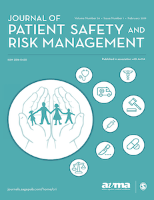
Journal of Patient Safety and Risk Management
Transforming healthcare risk management for better patient outcomes.Journal of Patient Safety and Risk Management, published by SAGE Publications Ltd, stands as a vital resource for the exploration and discourse surrounding safety and risk in healthcare environments. Established in 2018 and continuing through 2024, this journal delivers a rich repository of knowledge aimed at improving patient safety protocols and mitigating risks within healthcare systems. With an ISSN of 2516-0435 and an E-ISSN of 2516-0443, the journal is indexed in several categories with a notable performance in Health Policy and Health (social science), rated in Q3, while also addressing Leadership and Management in Q4. Despite the absence of an open access model, the journal provides a platform for researchers, healthcare professionals, and students to stay informed about the latest developments and evidence-based practices within the dynamically evolving landscape of patient safety. Given its Scopus rankings, which include a percentile of 46th in Health (social science) and 36th in Health Policy, the journal is positioned as a credible and impactful publication for those dedicated to enhancing patient care through robust risk management strategies.

International Emergency Nursing
Bridging the gap between research and practice in emergency care.International Emergency Nursing is a distinguished journal dedicated to advancing knowledge and practice within the field of emergency nursing. Published by ELSEVIER SCI LTD in the United Kingdom, it has earned a prestigious place within the academic community, boasting a Q1 ranking in Emergency Nursing and ranking 6th out of 32 in its category according to Scopus metrics, placing it in the 82nd percentile. This journal provides a vital platform for researchers, practitioners, and students to disseminate their findings, share best practices, and learn about the latest innovations in emergency care from its inception in 2008 to the present. Although it is not an open-access journal, it ensures that valuable insights and research are accessible to a broad audience, fostering collaboration and education within the field. The journal's commitment to enhancing emergency nursing practices has made it an essential resource for those engaged in improving patient outcomes in critical care environments.
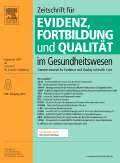
Zeitschrift fur Evidenz Fortbildung und Qualitaet im Gesundheitswesen
Transforming health policy with innovative insights.Zeitschrift für Evidenz Fortbildung und Qualität im Gesundheitswesen, published by Elsevier GmbH, serves as a pivotal platform for the dissemination of research and innovations within the realms of health policy, medicine, and education. Established in 2008 and continuing its impactful trajectory through 2024, this journal boasts a recognition as a Q2 journal in Education and positions itself within the Q3 tier for both Health Policy and miscellaneous Medicine categories, reflecting its dual focus on scholarly rigor and practical application. Despite not being an Open Access journal, it remains a valued resource for academics and practitioners, evidenced by its rankings: #214 out of 398 in Medicine (miscellaneous) and #829 out of 1543 in Social Sciences (Education) according to Scopus metrics. The journal's commitment to enhancing education and quality in healthcare makes it an essential read for researchers, professionals, and students seeking to stay abreast of the latest evidence-based practices and policies that shape health outcomes worldwide.
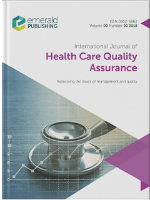
INTERNATIONAL JOURNAL OF HEALTH CARE QUALITY ASSURANCE
Connecting Ideas to Transform Health Care PracticesINTERNATIONAL JOURNAL OF HEALTH CARE QUALITY ASSURANCE is a leading academic journal published by Emerald Group Publishing Ltd, dedicated to advancing the fields of health care quality and health policy. Established in 1988, this esteemed journal addresses critical issues in health care management, offering insights into best practices and innovative strategies to enhance quality assurance in diverse health care settings. With an impact factor that places it in the Q3 tier across both health policy and business management categories, the journal serves as a valuable resource for researchers, practitioners, and students seeking to contribute to the conversation on health care quality improvement. Although currently not an Open Access journal, it remains accessible through various academic databases, facilitating a wide reach of its scholarly contributions. The journal's mission is to foster interdisciplinary dialogue and share evidence-based research that can inform policies and practices aimed at improving health care delivery globally.
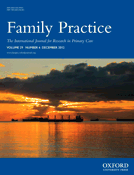
FAMILY PRACTICE
Exploring evidence-based solutions for better health outcomes.FAMILY PRACTICE is a premier peer-reviewed journal dedicated to advancing the field of family medicine, published by Oxford University Press. Established in 1984 and continuing its influential discourse into 2024, the journal holds an esteemed position in the academic community, as evidenced by its classification in the Q1 quartile for Family Practice, ranking 10th out of 56 in this category according to Scopus. With an impressive impact factor and a commitment to disseminating high-quality research, FAMILY PRACTICE serves as an essential resource for researchers, clinicians, and students alike, striving to enhance practice and education in family medicine through evidence-based insights and innovative practices. While the journal maintains a traditional subscription model, it supports broad dissemination of knowledge that contributes significantly to the evolving landscape of healthcare in the United Kingdom and beyond.

Journal of Healthcare Leadership
Navigating the complexities of healthcare leadership.Journal of Healthcare Leadership, published by DOVE MEDICAL PRESS LTD, is a distinguished open-access journal dedicated to advancing the field of healthcare leadership and management since its establishment in 2010. With an ISSN of 1179-3201, this peer-reviewed journal is recognized for its significant impact, currently holding prestigious Q1 quartile rankings in Leadership and Management and Public Health, along with Q2 in Organizational Behavior and Human Resource Management. The journal serves as a vital platform for scholars, practitioners, and students, offering insights into innovative leadership strategies and their implications in the dynamic healthcare environment. Operating from its base in Albany, New Zealand, The Journal of Healthcare Leadership also boasts impressive standings in Scopus rankings, including a top quartile position in Nursing Leadership and Management. With a strong commitment to open access, the journal ensures that high-quality research is readily available to its audience, reinforcing its role as a crucial resource for those aiming to influence healthcare policy, management, and education.

Risk Management and Healthcare Policy
Navigating the complexities of healthcare risk with expert analysis.Risk Management and Healthcare Policy is an esteemed Open Access journal published by DOVE MEDICAL PRESS LTD, dedicated to advancing the fields of health policy and public health. Established in 2008, the journal fosters a rich dialogue among researchers, professionals, and students, focusing on innovative strategies for managing risks within healthcare systems. With a current impact factor reflected in its robust Scopus rankings—placing it in the top quartile (Q2) in both Health Policy and Public Health, Environmental and Occupational Health—the journal is a pivotal resource that shares critical insights and evidence-based practices. The journal not only covers empirical studies and analytical research but also promotes discussions on emerging challenges and opportunities within the healthcare sector. As a result, Risk Management and Healthcare Policy serves as a vital platform for disseminating high-quality research, fostering collaboration, and informing policy decisions aimed at enhancing health outcomes globally.
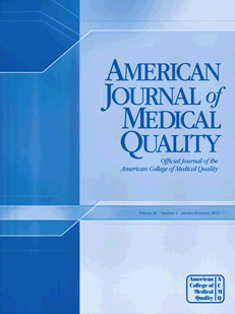
AMERICAN JOURNAL OF MEDICAL QUALITY
Driving Innovation in Healthcare Delivery and PolicyAmerican Journal of Medical Quality is a pivotal publication in the field of healthcare quality and medical policy, published by Lippincott Williams & Wilkins. Since its inception in 1992, the journal has become a critical resource for researchers, practitioners, and students dedicated to improving patient care and health systems through evidence-based practices. With a current impact factor that reflects its significance in the arena of medicine and health policy, the journal falls within the Q3 category in both Health Policy and Medicine (Miscellaneous) as of 2023, ranking 253rd out of 636 in general medicine according to Scopus metrics. This underscores its relevance and prominence among peers. The journal's scope encompasses a diverse range of topics related to quality improvement initiatives, healthcare delivery systems, and policy analysis, making it an essential read for anyone invested in advancing medical quality standards and practices. While it is not an open-access journal, the content is meticulously curated to enrich the academic discourse and inform best practices in medical quality. With an ongoing commitment to addressing contemporary challenges in healthcare, American Journal of Medical Quality serves as an influential platform for advancing the knowledge and implementation of quality initiatives in medical settings.

Journal of Patient Experience
Innovating healthcare by prioritizing patient perspectives.Journal of Patient Experience, published by SAGE Publications Inc, serves as a vital resource in the realms of Health Policy, Health (Social Science), and Leadership and Management. This open-access journal, established in 2014, is dedicated to enhancing the understanding of patient experiences and its implications on healthcare delivery and outcomes. With an impressive impact factor indicative of its scholarly significance and a current category quartile ranking of Q2 across multiple disciplines, it plays a crucial role in disseminating innovative research that informs policy and practice. The journal is indexed in Scopus, further affirming its contributions within the social sciences and healthcare sectors. It aims to foster interdisciplinary collaboration among researchers, healthcare professionals, and students, driving the conversation toward meaningful improvements in patient care. Its continued commitment to excellence makes it an essential read for anyone invested in the future of healthcare.